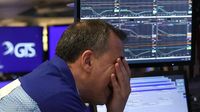The Australian share market faced significant turmoil on April 9, 2025, as it resumed its downward trajectory following a chaotic session on Wall Street. The S&P 500 index teetered on the brink of a bear market, prompting fears of a global trade war as U.S. President Donald Trump prepared to implement sweeping tariffs against trading partners.
By 12:30 PM Perth time, the S&P-ASX200 had surrendered nearly all of its gains from the previous day, initially down by 2 percent before clawing back to a 1.1 percent decrease, settling at 7428.7 points by 10:45 AM. This decline was heavily influenced by Mineral Resources, which saw its shares plummet as much as 14 percent after Citi lowered its forecasts on lithium stocks, extending the miner's losses over the past week to a staggering 35 percent.
Market analyst Josh Gilbert from eToro noted, “For now, uncertainty and volatility will remain high, recession chatter will continue, keeping risk assets under pressure until we get clearer direction on tariffs, negotiations, and central bank moves.” His comments echoed the sentiment in the market, which reacted sharply to the latest developments in U.S. trade policy.
On the U.S. front, the S&P 500 had earlier experienced a 1.6 percent drop after a brief surge of 4 percent. This volatility followed the White House's announcement that it would not offer concessions to China or other exporting nations, leading to the steepest four-day loss for the index since its inception in the 1950s. A staggering $5.83 trillion (approximately $9.83 trillion AUD) was wiped from stock values during this period, with the index now down 12 percent since Trump confirmed the tariffs on April 2, 2025, and 19 percent from its record high in mid-February.
Investor concerns centered on the possibility of a global trade war, particularly as the U.S. raised tariffs on China to 104 percent following retaliatory measures from Beijing. Trump’s refusal to back down has left markets bracing for a prolonged period of uncertainty. “The era of trade liberalization, free market reforms, deregulation, and fiscal discipline is officially dead and buried,” stated Luke Yeaman, chief economist at Commonwealth Bank. He emphasized that the U.S. administration is fully committed to its tariff strategy, which he views as a long-term project rather than a mere negotiating tactic.
In addition to stock market declines, commodity and currency markets were jolted by the news. The Australian dollar fell below 59 cents against the U.S. dollar, iron ore prices dipped below $95 a tonne, and crude oil was trading under $60 a barrel for the first time in four years. The ASX200 experienced significant losses across various sectors, particularly in energy, technology, and banking, with all but one of the market's 11 sectors opening in the red.
Alcoa shares fell by 8.2 percent, while appliance maker Breville dropped nearly 6 percent. BHP, a major player in the mining sector, lost 4 percent, and lithium miner Pilbara Minerals saw a 6.7 percent decline. The pharmaceutical company CSL also faced a 3.5 percent drop after Trump hinted at expanding tariffs to include pharmaceutical imports.
Meanwhile, the volatility in the Australian market was mirrored in Asia, with major indices in Hong Kong and Tokyo losing more than 3 percent. The Australian share market had opened 2.1 percent lower, wiping approximately $55 billion off the value of Australian stocks as traders awaited the implementation of tariffs set to take effect at 2:01 PM AEST. This downward trend was fueled by fears surrounding the impact of U.S. tariffs on China, which have now escalated to unprecedented levels.
Adding to the economic strain, the Reserve Bank of New Zealand announced a quarter-point cut to its benchmark interest rate, lowering it from 3.75 percent to 3.5 percent. The bank cited the U.S. tariffs as a significant downside risk to the New Zealand economy.
The Reserve Bank of Australia, having met the previous week, opted to maintain its cash rate at 4.1 percent, but analysts warn that the ongoing trade war could eventually compel a reevaluation of monetary policy as global economic conditions deteriorate.
As the market continues to react to these developments, analysts are left pondering the potential long-term consequences of the escalating trade tensions. The immediate outlook remains bleak, with many predicting further declines in stock values as the reality of a protracted trade war sets in.
In the meantime, the Australian dollar has dropped to its lowest levels since the pandemic, trading at around 59.9 U.S. cents, having previously plummeted to a low of 59.15 cents earlier in the day. This depreciation is viewed as a proxy for the broader economic implications of the U.S.-China trade conflict, given that China is Australia's largest trading partner.
The market's response to these tariffs has been swift and severe, with all sectors of the ASX trading in the red. Analysts warn that the fallout from this trade war will not only affect the stock market but also have broader implications for global economic growth, particularly in regions heavily reliant on trade with China.
As the situation evolves, investors and economists alike are left to navigate this turbulent landscape, hoping for clarity and stability amid the chaos.









